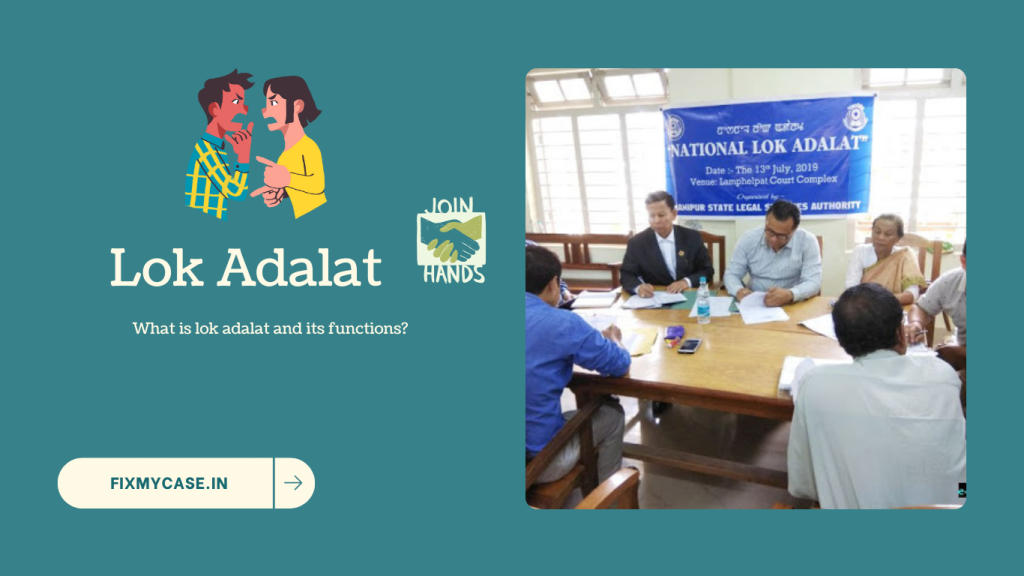Lok Adalat is a court procedure developed by the Judiciary to facilitate reconciliation between the parties in court cases. Let us know this in detail.
Lok Adalat Name Explanation?
Lok Adalat is a mechanism of alternative dispute resolution in court. “Lok” means people and “Adalat” means court. It can also be called People’s Court. Former Chief Justice of the Supreme Court of India P.N.Bhagawathi played a major role in introducing the people’s court Lok Adalat.
What is Court Lok Adalat?
Popularly known as Lok Adalat and People’s Court, this court procedure helps resolve people’s issues on the basis of peace and reconciliation between litigants and defendants. People’s Court Lok Adalat is a procedure created by the Judiciary to resolve people’s cases through peace and reconciliation.
A judge may refer a case to the Lok Adalat either on the basis of the wish of the concerned petitioners or arbitrarily to facilitate the disposal of pending cases in India.

When was Lok Adalat started?
The procedure of Lok Adalat in Indian courts was first started at Junagadh in the state of Gujarat on March 14, 1982.
This procedure was ordered to be followed in all the courts across the country because of the success of the Lok Adalat procedures in the Gujarat courts.
What are the differences between Lok Adalat and People’s Court?
People who conduct cases in court think that Lok Adalat and People’s Court are different, in fact it is a wrong information, both are one and the same, there is no difference between them.
Lok Adalat is held in court according to which law?
Lok Adalat was brought into practice on the basis of Civil Procedure Code i.e. Legal Procedure Code to implement Lok Adalat in court.
The Lok Adalat is enforced under Section 89 of the Civil Procedure Code. And the Acts created by the Judiciary to process the Lok Adalat are Lok Adalat under section 19 of the Legal Services Authorities Act.
Thus Lok Adalat are created in the courts and used for the service of the people.
What are the functions of Lok Adalat?
Legal works created by the Judiciary for the people are processable in the Lok Adalat Courts as per Legal Services Authority under section 19.
Legal Services Authority under section 19 shall be a three-judge court sitting in the Lok Adalat.
Lok Adalat session is not a court procedure. Common people can approach the court arbitrator without any fear and can easily get judgment in cases without the help of lawyers.
A Lok Adalat session consists of one or three arbitrators.
A serving or retired judge of the Lok Adalat will be the arbitrator and one of the three will be a social worker or public welfare worker or a third-party lawyer employed as an arbitrator in the Lok Adalat.
If the Lok Adalat arbitrators are advocates, then the advocate who does not agree to the case will sit as arbitrator in this session.
In most cases a retired judge or advocate or even a judge of the concerned court presides over this Lok Adalat session, a three-member judicial panel sits to interrogate the litigants and settle their grievances.
What are the special features of Lok Adalat?
Through the Lok Adalat which is conducted for the benefit of the people, not only the cases pending in the court but also the petitions which are coming before the court can be settled by conciliation and settlement.
Can appeal be made in Lok Adalat case?
In a case pending before the court, the plaintiff and the defendant both decide to end the case and enter into a compromise agreement through the Lok Adalat and no appeal can be made.
So closing a case in this Lok Adalat means you should close the case only if you are satisfied with the judgment of that case, because if a case is closed in Lok Adalat then that judgment is the final judgment and you can’t appeal against it no chance.
What are the types of cases decided in Lok Adalam?
Many cases are settled in court through Lok Adalat, let’s know what kind of cases can be reconciled Property Cases, Civil Cases, Check Cases, Motor Accident Cases, Family Matters Cases, Industrial Disputes, Labor Dispute Cases, Conciliatory Cases in Criminal Cases, Land Acquisition and Compensation Cases, Bank Loan Issues, Rent Issues, Sales Disputes related to tax, income tax and indirect tax, such cases are resolved.
